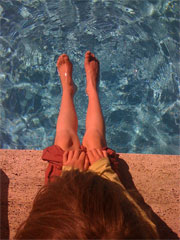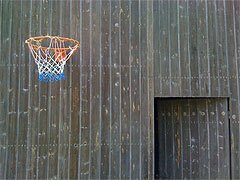Growing Pains
She changed into her pajamas in the living room, doing a funny kind of half-dressed jig to entertain us, happy to laugh and happy that we were laughing with her. I said something that made her run away from us – a pretend threat to pinch her, or a comment about her lack of underwear. She turned too quickly and stubbed her toe on the base of the couch. (We are at our country house, where there’s a sagging, old futon with odd parts of metal protruding from the bottom.) She shrieked and exploded into tears.
De-facto and I remained seated at the table. It’s not that we are insensitive, but early on we agreed to be the parents that wait a beat (or two) before coddling our children after they have hurt themselves, reserving our rushing-over-to-console-efforts for those boo-boos that actually merit such earnest concern. We were, perhaps, too cavalier about this when Short-pants was a little toddler. She’d tumble and we’d quickly suggest to her, “you’re okay!” Later we came to understand that she thought “you’re okay,” meant “ouch, it hurts!” After a fall, she’d jump around, in obvious pain, shouting, “I’m okay! I’m okay!”

She sat on the couch and screamed again, her face in a grimace, red with tears. “I’m always hurting myself!” she cried.
Short-pants does stumble a lot. She trips and falls more frequently that most children her age – and I know that 8-year olds can trip and fall a lot – but she is constantly nursing a hurt toe, foot or knee. She moves with short, jerky motions, especially when she is excited, which often causes her to bump into something and bang or bruise one of her appendages.
Part of this is related to a broken leg at age 4 that was, unfortunately, set incorrectly, a fracture which, though we’ll never be sure, we believe is related to her brain abscess. She had just learned to walk again after a coma and two brain surgeries and six motionless weeks in a hospital bed. She overestimated her strength while hanging on a bar in the park, fell on her leg and broke it, after which she spent eight weeks in a cast and then had to learn how to walk again. Except after the cast came off, the leg was longer and slightly turned. This would set anyone back a bit, let alone someone with a little neurological story like hers.
We were diligent about physical therapy, until one day it felt like she spent too much time going to medical appointments and that maybe the best therapy for her was to just be a playful kid. The French doctors all agreed, a bit too readily, “Her legs will even out, you’ll see, pendant la croissance.” During the growth. I could tell they were mocking my concern – I was one of those obsessive (American) mothers and if I’d just relax it would all be fine.
This is the line we walk – all mothers, not just mothers who’ve been hospital mothers – the fine line between advocating for your child and obsessing over her. I don’t want to hover and try to direct everything in her life. But to what degree is my role as parent to make sure she has the best care possible and that we’ve done everything we can to help her? It’s not that she has to have perfect legs and run like a gazelle and win every race. I just want her to be able to move comfortably and do the things she wants to do. And when she’s an old bat, I don’t want her to be in pain because her pelvis and back are all messed up because her leg was never attended to.

We’ve waited a few years, and the croissance is indeed happening, in amazing spurts, but her leg is still longer and it’s still crooked. She’s not really getting stronger or more coordinated. If anything, she’s discovering that she’s not as swift or steady as her school friends, and starting to shy away from physical activities where she knows this will be apparent. We try to encourage her, with modest success (De-facto has her playing basketball and the practice is helping) but we don’t want to nag her and make it larger issue than it already is.
A few weeks ago, I decided it was time for an expert opinion, so I returned to one of the PTs who’d worked with her before. He was terrific – said all the right things to her about finding a physical activity she loves and practicing and working at it. He gave me that look that said I know you want me to fix this and I can’t, but she can, if she works at it. He gave us some exercises to do together, but of course, I haven’t been so diligent about it. I’ve not been very diligent about my pilates, either. It probably doesn’t help that her mother is much better at laying in bed and reading than running laps at the basketball court.
I looked at De-facto. “I wish I knew what to do to help her move more fluidly,” I said.
“She’s missing a little part of her brain,” he whispered back. “She’s a miracle, remember?”
I do remember those awful days when Short-pants was in a coma, when all I wanted her to do was survive. I bargained with someone above to keep her with us in any condition. A funky leg that makes her a bit uncoordinated and a left side that isn’t as strong as her right side? No problem, we’ll take it. Just give her back to us. That’s what I would have said. More or less, it’s what I did say.
Short-pants hobbled over to the table and folded herself in her father’s lap. I listened to him talking to her in his low, soft, reassuring voice. He explained it all to her, how maybe she falls and trips a lot because of the operation on her brain, and how it takes her a bit longer to learn to do physical things. He put all those big-person concepts into littler-person words so she could understand. And maybe, he said, it all had to do with the thing that was in her brain, but maybe not, we’ll never know for sure, but what we do know is she can do anything she wants to do, just sometimes she has to work longer to get her body to learn how to do it.
He always knows the right way to frame things for the girls, to tell them the truth without talking down to them or being patronizing. He’s the best explainer there is.
Short-pants rested in his arms, taking in all he said. I watched from across the table, admiring the two of them in their embrace. Then she pushed herself up, out of his lap and limped around the table to me and curled her lanky legs up in my lap.
“Don’t worry, mama,” she said, “I’m okay.”